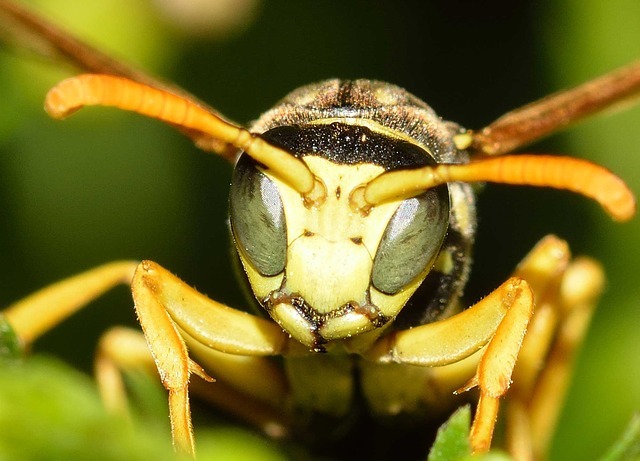If there is a lot of “buzz” happening around your house this summer, your patio, deck, or your back yard may be the new gathering spot for wasps and stinging insects. This can be very frustrating for any homeowner because it typically will impact your family’s enjoyment of the outdoor living space the home provides.
Nobody wants to be stung and for those who suffer an allergic reaction, it can be dangerous. But, there are things you can do to keep these pests away from your yard, deck and patio areas, leaving these outdoor spaces for your family to enjoy.
.jpg)
Your patio should be a place of enjoyment:
you shouldn’t have to worry about wasps.
Build It and They Will Come
As soon as a home is built it becomes a target location for wasps and hornets to nest. According to nedstevens.com, these insects are always seeking damp or moist areas to nest, mainly because they need water nearby, which allows the colonies to drink, hunt and prey on other insects. Your home has a few key areas that can collect water, so it is important to check your property for signs of moisture and standing water. If you find it, your next step is to determine the cause.
Also note that if you are seeing several wasps or hornets hanging around a specific area of the house, there is probably a nest near that area and water nearby. Inspect these areas carefully and thoroughly.
If you find a nest, you can get it removed by an exterminator or remove it yourself, but the problem will continue as long as your home is providing what the wasps need: standing water. If you can address the water issue, you can make your yard and home unappealing to the wasp population.
Steps you can take:
Gutter Covers
When it comes to standing water, your home’s gutter system may be a huge source of encouragement for wasps and hornets to make your house their home. Finding clogged gutters or excessive moisture around your home’s foundation is a sign that water is not flowing out of your gutters properly.
In some cases the easiest solution is adding specially designed gutter guards, which attach to the gutter system and prevent leaves and debris from falling inside. This keeps water flowing properly through the gutters and away from your foundation. Gutter guards offer a lifetime of protection for your home and end the dangerous task of cleaning gutters.
Regular Cleaning and Inspection
With most older gutter systems you have to stay diligent at inspecting and cleaning out debris and repairing any damage on a regular basis. Upkeep includes:
- Making certain nearby trees and their leaves are not hanging over the gutters since debris will easily fall into the system and start to build up.
- Climbing the ladder several times per year to inspect and ensure your gutter system is in working order 100 percent of the time and that water is flowing away from your home.
- Cleaning out even small amounts of debris following storms and weather events that involve wind. Build up in unprotected gutters can happen quickly after severe weather.

Remove Sources of Standing Water
Standing water is appealing to wasps and other insects. You need to discard anything that holds standing water. Look around your property and remove:
- Bird baths
- Tires, old buckets or unused planters
- Little kiddie pools or toys that collect and hold water
Other Solutions
- According to thriftyfun.com, painting the ceiling of your porch sky blue can be helpful in preventing wasps from nesting there. The insects see the color and think it is the sky, so they won’t build a nest in this location.
- According to buzzaboutbees.net, gardening centers sell a product called Waspinators, which is designed to work by mimicking a yellow jacket nest. Essentially, you add a couple around the exterior of your home and since wasps are territorial, they avoid the area because they think it is already taken by other wasps.
The best way to limit the number of wasps in your yard is to address the reason they are there. Eliminate water sources and other things that make your yard attractive to the insects. Ensure that your gutters are clean and that they allow water to flow freely. To learn more about gutter covers and how they can protect your home from pests call 1-800-975-6666.
